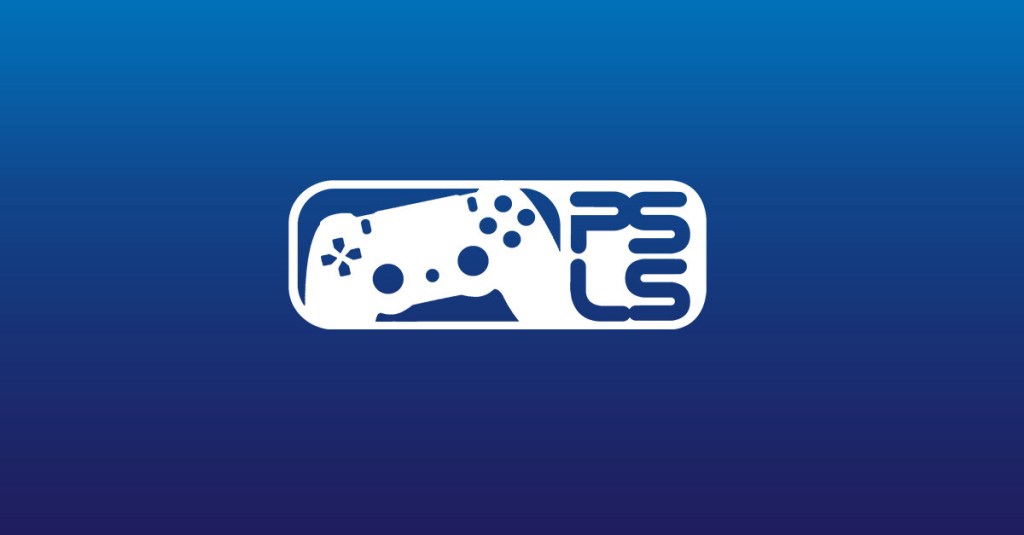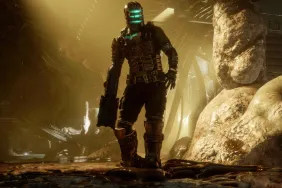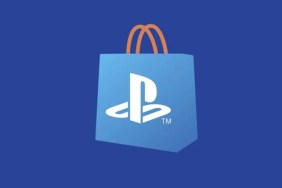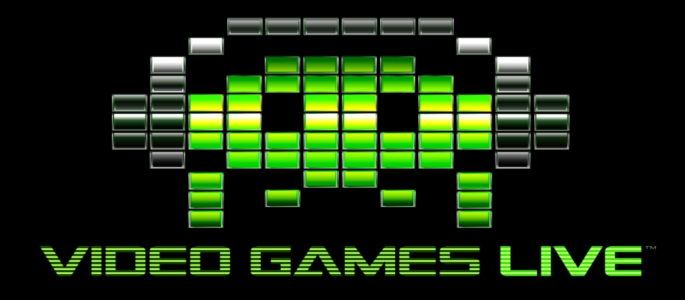
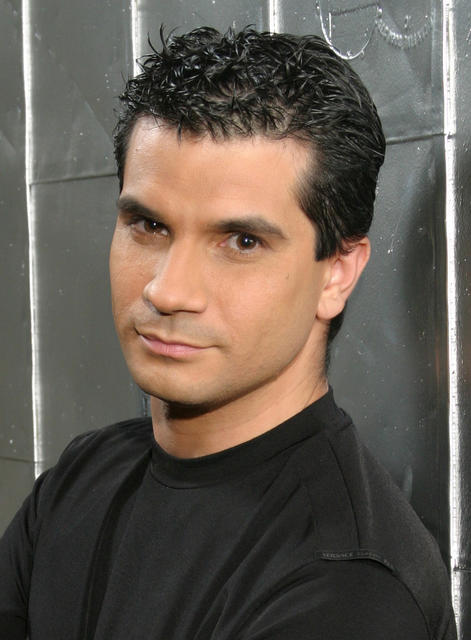
Do you remember where you were and what you were doing when you came up with Video Games Live?
My two greatest loves growing up were always videogames and music. When I was 10 years old I used to take my Dad’s big cassette recorder and go down to the local arcade and local pizza parlor and record my favorite videogame music on cassette tape. Then I’d come home and record my favorite home systems, you know: Atari 2600, Intellivision, Commodore 64, Apple II, and I would take all the music and the sound effects and then I would splice the tapes together. And I’d invite my neighbourhood friends over, and I put my favorite videogames up on the screen and I’d charge them all a nickel and I’d play the cassette back, and I’d grab a plastic guitar and jump up in front of the TV and pretend like I was playing around to the thing. So I guess those were the first videogame concerts.
This is something that I’ve kind of always wanted to do my entire life… Being a videogame composer for 20 years, about 8 years ago, I just, you know, I wanted to prove to the world… how culturally significant and artist games had become, you know, and that’s why I created the show the way I did, too, it’s not just for hardcore gamers. I wanted somebody… a grandmother, who knew nothing at all about videogames to be able to come to the show, be able to follow along with the video, and understand the stories and this and that, and have a whole new understanding and appreciation for the entire videogame industry. So you know, that was really the goal and plan from the start.
Thinking back to the first show, can you describe how difficult the process was?
Oh for sure! That’s a great question. I mean the first show took me three years… it took me three years to put on the first show. I started video games live in 2002 and our first show wasn’t until July 6, 2005 some three years later. Everyone thought I was completely insane, you know, no one believed – that’s, the videogame companies were looking at me like I was crazy, you know – “who would come see an orchestra, this isn’t Japan where they do all this stuff all the time, and you want video screens and million-dollar production, you’re insane.” And then that first show we did at the Hollywood Bowl with the L.A. Philharmonic, over 11,000 people showed up. It was the biggest videogame concert in the world, so people started to believe me a little bit then, but still not all the way, but it still took a long time. But the first show was crazy emotional for me, only because I felt… I remember about five minutes before going on-stage for the first time, I was sitting in my dressing room crying, because I hadn’t really thought about, it was just oh this dream, I’m just going, going, going, never take no for an answer, you know, this and that, and then it all hit me right before I was going on for the first time, like “what the hell am I doing?” I’d never put anything on like this before, and everything, and then I kinda felt the whole weight of the entire videogame industry on my shoulders, in that if this gets screwed up, you know, the industry’s going to take a step backwards, but if it’s a great show then we take a step forward, and all that stuff kinda came rushing to my head all at the same time it was kind of emotional and then I’m just like “What am I doing? Screw this, get out there,” you know, so it was crazy, a lot of pressure a lot of emotion and everything had been working up to that exact point in time, it’s like “whelp, here we go, let’s do it,” ya know.
What would you say is your favorite game music tune that you guys do and why?
For me, as a segment in the show, I think one of my favorite pieces is Warcraft… We have a lot of different Warcraft segments, but our main Warcraft segment. The reason is is because everything in it I think just comes together perfectly. The music is powerful and beautiful, and the choir is so strong… The video is just incredible, you know, those Blizzard cinematics are just second to none. The lights, and the way they work throughout perfectly with the music and with the video and everything. So as a segment, you know it just all comes together great. As a performer, when I play, I like Castlevania, I kinda do this Rock-and-Roll arrangement of Castlevania, so that’s probably my favorite one to play onstage, but as a segment in the show… A lso, Chrono Cross and Chrono Trigger is another really powerful one, you know, I think the audience gets into it so much, that has its advantages as well but I’d say Warcraft’s the favorite. Now the audience’s favorite is usually Final Fantasy, Mario, Zelda, Warcraft, those are probably the four favorites from the audience standpoint that they always like. And Chrono as well.
How do you choose what songs make it into your schedule?
Well, I’ve created over 60 segments for Video Games Live over the last eight years, and we can only play about 18 of them a night. So…yeah, it’s a lot, and so we’ve never played the same show twice. So every set list is different for every single show that setlist we’re playing, I mean this is our fifth time back to LA, and so the show that people are going to see this year is 85% different than the one last year, which was different from the year before, different from the year before. For me it’s gotta be good music, great music, you know, that’s the first thing on the list. Has to be great music. Doesn’t have to be a popular game, you know we’re doing the world premiere here this week of the game Afrika, which wasn’t a hugely-bought game I think… Beyond Good & Evil is in the show, ’cause I love the music, I love the story of the game, Shadow of the Colossus we’re playing here, which again wasn’t a big-selling game, people who played it loved it, but… Advent Rising, a game that I worked on that tanked hard in sales… So the music has to be great, that’s the first thing.
And then from there, I’ll look at the visuals, and is it something, cause you know there’s a lot of great music in military games for example. But I don’t want to have and hour of just people shooting each other, so I like the rich storytelling… You know, we have Metal of Honor in our show, and things like that, but we do a retrospective – a World War II retrospective as opposed to just showing first-person shooter footage. The same with Halo, Halo has so many beautiful scenes and great characters and great storyline elements that, you know, you don’t need to show the violence. Metal Gear Solid’s another one, it’s an M-rated game, God of War – M-rated game…But we don’t show any of that stuff. So it’s really important to me to make a show for everybody. Make it for the families. And the content has enough amazing stuff on its own whether it’s the graphics, the music, the characters, the storyline, that we really kind of stayed away from all that stuff.
But choosing the setlist from night to night is just… I look at if we’ve been to a city before, I’ll look at what we played before and start slotting in different things… I try to keep the show flow, it’s really important that it’s very dynamic. So I don’t want to just play eight giant, massive choir tunes in your face all in a row, you know, I really try to do the setlist like this. There might be a big piece, and then a slow piece, and then a classic piece, and then something different like a soloist comes out and maybe plays a piano thing. Or an interactive segment where I’ll bring people onstage and they play a videogame. So always mixing and matching to keep the setlist. So I’ll kind of keep that formula and then kinda slot in different things and then if I’m playing a place for the very first time, well we go with our old reliables – the ones that we know are the most popular segments that we play – Mario, Zelda, Warcraft, Final Fantasy, check. Then there’s Metal Gear Solid, God of War, Kingdom Hearts… there’s definitely pieces – Castlevania, MegaMan, things like that, that we know our audience favorites and that we’ll put in the show when we play for the first time. But then when we come back to a place like this, we’re playing stuff here that we’ve never played here before, like Assassin’s Creed 2, Shadow of the Colossus, Uncharted 2 – we’re doing the world premier of it here. And, you know, gotta keep the classics in there as well, I mean fifty percent of the audience who come here have never seen our show before. So you definitely gotta play Mario, you gotta play Zelda, you gotta play some bit of Warcraft, Final Fantasy VII, so we gotta take all that stuff into account when we put a setlist together. I have this massive Excel spreadsheet of every single show we’ve ever done, it’s like 160 shows. It shows the date, the time, and the place we were at, and what we played and how we played it. I’m always referring to that like once a day.
What would you have to say to aspiring videogame musicians?
There’s a bunch of things! I created a nonprofit organization about nine years ago called The Game Audio Network Guild, the URL is audiogang.org, we have over 2,000 members now, representing over 35 countries around the world, as a thing I started to network with all the composers from around the world, but for people who are looking to get into the videogame industry, to show them what to do, how to do it, where to go. So I would say for people aspiring to get in the industry, sign up for audiogang.org, go there, become a Gang Member, and then going to the Game Developer’s Conference, really important, ’cause our industry’s all about networking… Meeting the people. Just sending somebody a demo CD, or music on a CD, means nothing, you’re wasting your time. You have to meet the people face to face, you have to get to know them, [ask] “Hey, can I help you out, how can I help you…I won’t even charge you any money, what can I do to make your life easier today?” So going to Game Developers Conference website – gdconf.com. I would also recommend joining your local IGDA, International Game Developers Association, igda.org, another nonprofit. Again, going to your local spot and meeting local game designers… There’s a lot of independent folks and getting in with those folks now before they… Work your way up with them in the industry, that’s always a good thing. The final thing is there’s some amazing books that you can get – “The Complete Guide to Game Audio” by Aaron Marks and “Audio…Processes…”the author is Alexander Brandon. Actually, if you just go on Amazon.com, under books, put in “game audio,” you’ll see two or three really amazing books for $18-$2, whatever it is, the books are this [a few inches] thick.
We would like to thank Tommy Tallarico for taking time out of his busy schedule to speak with us, and wish him continued success in the future.
